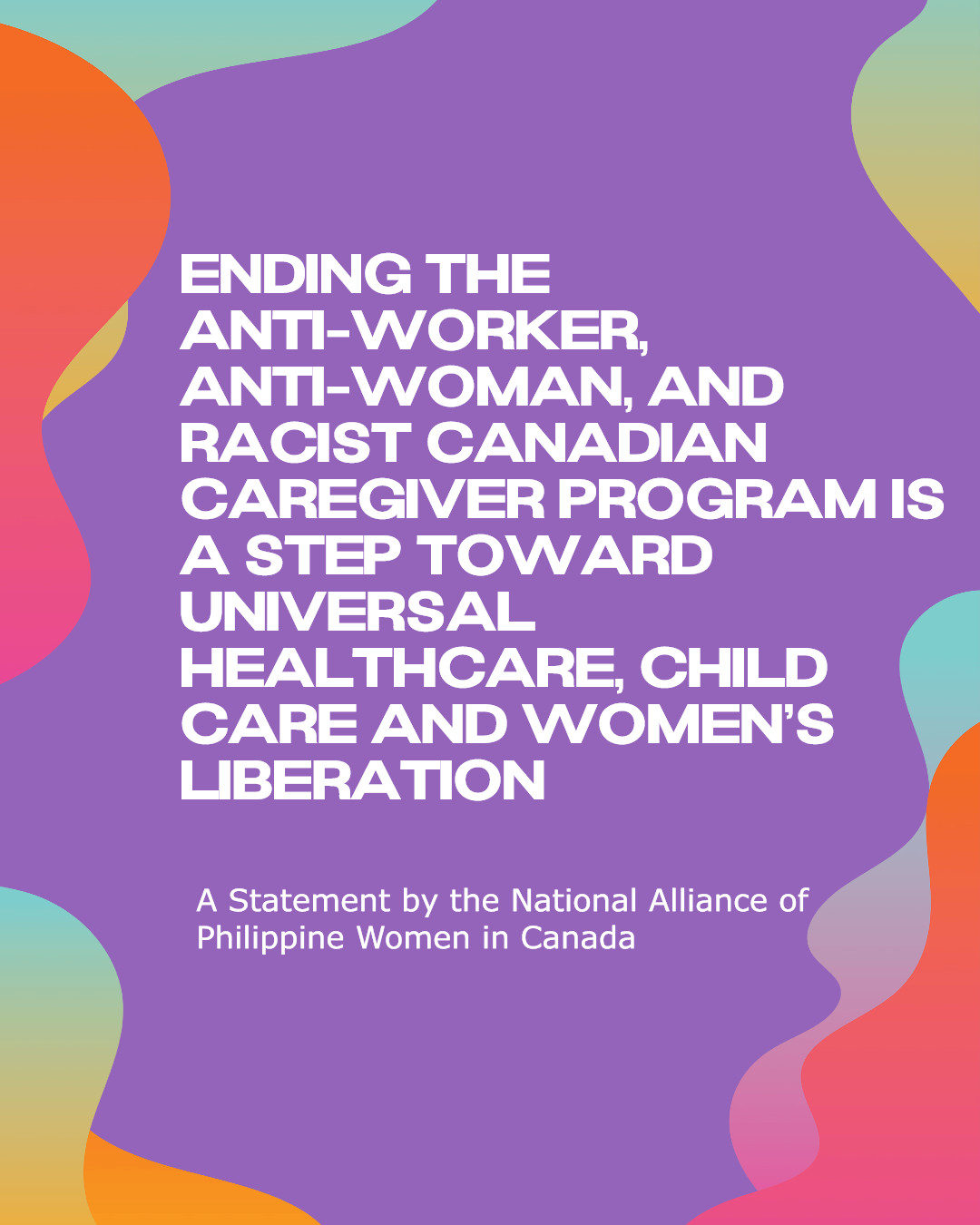On this International Women’s Day, we at the National Alliance of Philippine Women in Canada (NAPWC) strongly affirm the path towards genuine liberation for all women from the perspective of our transnational working class community. Recognizing that at the root of current social crises are regressive state policies in immigration, privatization of healthcare, and temporary labour programs like Canada’s Caregiver program. As such we call on all to join our fight against these systemic causes of women’s oppression and exploitation as part of our continuing struggle for women’s development and emancipation.
The COVID-19 pandemic has exposed the Canadian public healthcare system as severely neglected and deteriorating. Our long term care homes and hospitals are more understaffed and under-resourced than ever. Filipino women continue to make up a large part of the workforce in these institutions. As Filipino women, we know this first-hand and have always fought against these deplorable conditions. This global pandemic has shown that women of colour – working as Personal Support Workers (PSWs), caregivers, nurses, and aides – are at the forefront of the fight against the pandemic, caring for Canadians at the expense of their own health, safety, and lives.
The Canadian government continues to rely on unstable, low-paying, and precarious jobs to fix its crumbling healthcare system. This is evident in the Ontario government’s plan to quickly expand the Personal Support Worker (PSW) workforce in response to the pandemic while denying workers rights to paid sick leave or even grant “pandemic pay” for decent living wages. The government expects underwaged PSWs to fill the national care gap, instead of expanding on stable and secure healthcare worker positions and resources.
In Ontario, PSWs make as low as $17 an hour. Canada’s labour policies prevent highly educated and experienced healthcare workers from other countries from practicing their professions, and instead are deskilling those working as nannies and PSWs. Canada’s current Caregiver Program (also under the Temporary Foreign Workers’ Program) targets workers with extensive healthcare backgrounds. These workers are mostly women from Global South countries, of which a large majority (88% as stated in 2017 IRCC reports) come from the Philippines. When well qualified professionals are barred from practicing in their own fields and being compensated accordingly, it is clear that short-term band-aid solutions are the preferred method of action under Canada’s profit-driven healthcare model. This only continues to prove there is no long-term plan to solve the healthcare crisis by using temporary solutions to the ongoing and long-standing problems.
Since the 1970s, Filipino women have come to Canada under the various caregiver schemes which were always under the Temporary Foreign Worker Program. We have come to work as caregivers often for wealthy private households, families, and individuals who need child care, elderly care, and other specialized health care needs that are available only for those who can afford it. We are further exploited under Canada’s oppressive immigration program that prioritizes the expansion of temporary labour, instead of implementing policies that guarantee transnational women and workers’ security and stability to permanently live and work in Canada.
Working under this program means being underpaid or economically exploited. It means working in constant fear of deportation, separation from families in the Philippines for many years, isolation with little to no friends or family for support, and the ongoing fear of physical, sexual and emotional violence that can come from employers. This is often borne by the women in order to “get through” this program and reach the possibility of permanent residency in Canada. How can we achieve a Canada where transnational working women can live without the fear of violence and deportation and the long-lasting impacts of family separation? This is why we have always viewed Canada’s caregiver program as an issue of Violence Against Women and an overall women’s rights issue. These are the legislated policies of Canada’s labour programs masked as immigration choices that make our lives in Canada precarious, temporary, and unsafe like so many other transnational workers. Our struggle to determine our genuine settlement and integration is a political struggle against these policies that exploit and entrench our lives in precarity and instability.
We are calling for the accreditation of workers with professional nursing backgrounds as part of our demand for meaningful work, safe, and secure working conditions. We want the end of legislated family separation, and instead recognize that family reunification and support is necessary in ensuring that women and their families can thrive in Canada. We want an end to profit-driven, employer-focused and temporary labour programs, and instead call for Canada to allow the opportunity for all transnational workers to be accredited for their skills and talents and to be compensated accordingly for all their vital contributions to Canadian society. It is only through supporting working women and people-centred perspectives that we can succeed in our fight for a truly universal healthcare system for all in Canada.
In 2021, the social and cultural discussion on women’s rights, economic equality, and empowerment has become mainstream. As women, we have found strength in numbers like we have never seen before. While we applaud working women on the frontlines, our challenges remain and are far from over. As such, our resolve must continue to strengthen as we fight not only for concrete changes toward better working and living conditions, but also for our development as women to the highest capacity and intensity. In the spirit of militant solidarity, we salute all women continuing the fight for equality and liberation for all women.
-11-
Charie Siddayao
Philippine Women Centre of Ontario
pwcontario [at] yahoo [dot] ca
Instagram: @pwc_ontario
Facebook: Philippine Women Centre of Ontario
Twitter: @pwc_ontario
